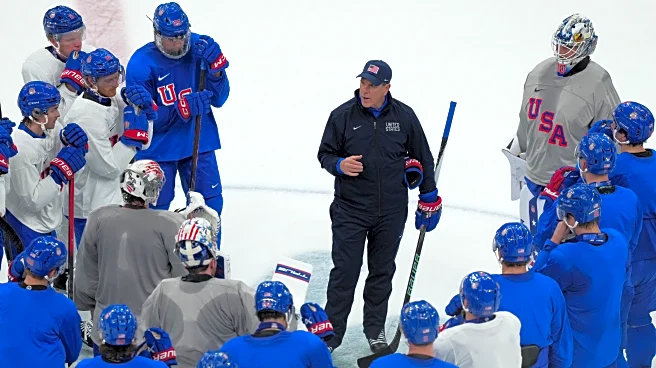What's Happening?
During a recent episode of the 'New Heights' podcast, Travis Kelce, Kansas City Chiefs tight end, declined to discuss his personal life when prompted by his brother Jason Kelce. The conversation took place on November 5, as Travis emphasized his focus
on preparing for the upcoming game against the Denver Broncos. Despite Jason's attempts to steer the discussion towards Travis's off-the-field plans, Travis remained committed to discussing football strategies. This exchange highlights Travis's dedication to his sport, even as public interest in his personal life, particularly his relationship with Taylor Swift, continues to grow.
Why It's Important?
Travis Kelce's refusal to discuss his personal life on the podcast underscores the challenges athletes face in balancing public interest with professional commitments. As a high-profile NFL player, Travis's personal life often attracts media attention, particularly due to his relationship with Taylor Swift. However, his focus on football highlights the importance of maintaining professional priorities amidst external pressures. This situation reflects broader themes in sports media, where athletes navigate the intersection of personal and professional identities, impacting their public image and career trajectory.
What's Next?
Travis Kelce's commitment to football suggests that he will continue to prioritize his athletic performance over personal disclosures. As the Chiefs prepare for their upcoming game against the Denver Broncos, Travis's focus remains on contributing to his team's success. The podcast may continue to explore sports-related topics, with Travis and Jason engaging in discussions that emphasize their professional experiences. This approach may influence how other athletes manage public interest in their personal lives, balancing media engagement with career goals.
Beyond the Headlines
The exchange between Travis and Jason Kelce highlights the evolving nature of sports media, where athletes are increasingly expected to share personal insights alongside professional achievements. This trend raises questions about the ethical considerations of media coverage, particularly regarding privacy and the impact of public scrutiny on athletes' mental health. As sports figures navigate these dynamics, they may influence broader discussions about the role of media in shaping public perceptions of athletes.

















